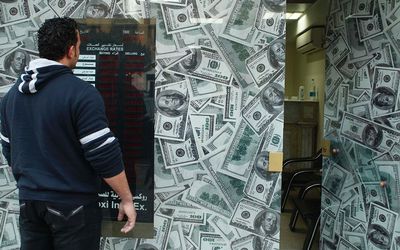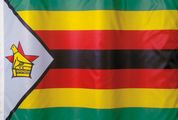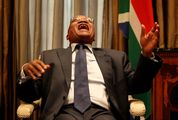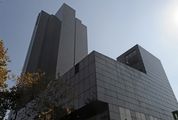Egyptian stocks set to extend record streak
by Agency Staff,
2016-03-20 15:12:49.0
EGYPTIAN stocks were set to extend their record winning streak as investors bet last week’s currency devaluation will boost the economy of the most populous Arab nation. Abu Dhabi shares fell as traders cashed in following the biggest jump since January.
The EGX 30 Index rose 0.5% as of 12.51pm in Cairo, extending its advance for a 12th day, the longest rally since Bloomberg started tracking the measure in 1998. About 261-million shares traded, compared with a one-year full daily average of 198-million. Abu Dhabi’s ADX General Index retreated the most in two months.
Undeterred by the biggest interest rate increase in at least 10 years, investors piled into Egyptian stocks after the central bank weakened the currency 13% last week, the most since 2003. The devaluation was part of policy makers’ plan to lure foreign investment and alleviate a dollar shortage that has crippled North Africa’s biggest economy. The EGX 30 entered a bull market this month and is now up 32% from a two year-low in January.
Egypt’s stocks are "seeing a clear trend reversal," said Cairo-based Ashraf Akhnoukh, the manager for Middle East and North Africa at Commercial International Brokerage Co. "Investors are taking in positive signals from the central bank as officials finally move to address the dollar shortage." The rate increase was already priced in, he said.
Property developer Six of October Development & Investment Co. was the biggest gainer, jumping 5.6% on almost three times the full-daily average trading volume in the past three months. The company said last week its 2015 profit more than doubled.
Abu Dhabi drops
The ADX General Index fell 2.4%. The gauge had climbed the most in seven weeks on Thursday. First Gulf Bank PJSC and Emirates Telecommunications Group Co, which together account for more than half of the gauge, led the emirate’s stocks lower.
First Gulf Bank declined 6.6% after rising 11% on Thursday. Etisalat dropped 1.9%, falling for a second day. The largest telecommunications operator in the United Arab Emirates, which shares a monopoly with Dubai’s Du, has retreated from the highest level in a decade this month after its 14-day relative strength index rose to 88, well above the 70 level that signals a security is overbought.
"The market is correcting itself following a strong and quick rally," said Tariq Qaqish, the head of asset management at Dubai-based Al Mal Capital PSC, which manages more than $160m in equities and bonds across the Middle East and North Africa. "Provided that global stocks and oil continue to rise, the drop we’re seeing today will probably be short-lived. We’re looking at buying opportunities in businesses negatively correlated to oil such as the telecoms sector, as well as high-beta real estate stocks."
Dubai’s Emaar
The six-nation Gulf Co-operation Council is home to about 30% of the world’s proven oil reserves, and nations in the region depend on income from crude to finance government spending. While Brent, a benchmark for half the world’s oil, fell on Friday, it closed higher for a fourth week, at $41.20 per barrel. The Bloomberg GCC 200 Index, which tracks the region’s biggest companies, added 0.3%.
Dubai’s DFM General Index rose 0.1%, even as Emaar Properties PJSC fell. The developer of the world’s tallest tower and the company with the largest weighting on the index lost as much as 3% after its board proposed a 2015 dividend of 15 fils per share. Emaar’s 2015 profit beat analyst expectations as revenue from apartment sales more than doubled. The shares closed 1.4% lower.
"Some investors expected higher dividends from Emaar," Mr Qaqish said.
Saudi bonds
Saudi Arabia’s Tadawul All Share Index was the biggest advancer in the Gulf, climbing 1.6% as it headed for a third day of gains. Jabal Omar Development Co led the increase, adding 6.8%, followed by National Commercial Bank’s 3.3% gain.
The kingdom’s central bank will issue 20-billion riyals of bonds this week, according to local news website Maaal.com, which cited unidentified people familiar with the plan. The offering includes both fixed and floating-rate notes with three-, five-and seven-year maturities.
Qatar resistance
Qatar’s QE Index swung between gains and losses before closing 0.1% lower at 10,414.65. While volumes have increased in recent trading sessions — about 7.5-million shares traded, compared with a six-month average of 6.1-million — the gauge hasn’t broken the 10,500 resistance level since early December.
Gulf International Services QSC slipped 0.4%. The company said one of its units is optimising costs as five offshore drilling rigs, one onshore rig, and one accommodation jack-up have been released from existing contracts. Gulf Drilling International is exploring potential new business opportunities throughout the GCC, it said.
Oman’s MSM 30 Index rose 0.4% in a third day of gains. Bahrain’s BB All Share Index advanced a fourth day, climbing 0.6%. Kuwait’s SE Price Index declined 0.1%.
Bloomberg

A man stands outside an exchange bureau in Cairo. Picture: REUTERS
EGYPTIAN stocks were set to extend their record winning streak as investors bet last week’s currency devaluation will boost the economy of the most populous Arab nation. Abu Dhabi shares fell as traders cashed in following the biggest jump since January.
The EGX 30 Index rose 0.5% as of 12.51pm in Cairo, extending its advance for a 12th day, the longest rally since Bloomberg started tracking the measure in 1998. About 261-million shares traded, compared with a one-year full daily average of 198-million. Abu Dhabi’s ADX General Index retreated the most in two months.
Undeterred by the biggest interest rate increase in at least 10 years, investors piled into Egyptian stocks after the central bank weakened the currency 13% last week, the most since 2003. The devaluation was part of policy makers’ plan to lure foreign investment and alleviate a dollar shortage that has crippled North Africa’s biggest economy. The EGX 30 entered a bull market this month and is now up 32% from a two year-low in January.
Egypt’s stocks are "seeing a clear trend reversal," said Cairo-based Ashraf Akhnoukh, the manager for Middle East and North Africa at Commercial International Brokerage Co. "Investors are taking in positive signals from the central bank as officials finally move to address the dollar shortage." The rate increase was already priced in, he said.
Property developer Six of October Development & Investment Co. was the biggest gainer, jumping 5.6% on almost three times the full-daily average trading volume in the past three months. The company said last week its 2015 profit more than doubled.
Abu Dhabi drops
The ADX General Index fell 2.4%. The gauge had climbed the most in seven weeks on Thursday. First Gulf Bank PJSC and Emirates Telecommunications Group Co, which together account for more than half of the gauge, led the emirate’s stocks lower.
First Gulf Bank declined 6.6% after rising 11% on Thursday. Etisalat dropped 1.9%, falling for a second day. The largest telecommunications operator in the United Arab Emirates, which shares a monopoly with Dubai’s Du, has retreated from the highest level in a decade this month after its 14-day relative strength index rose to 88, well above the 70 level that signals a security is overbought.
"The market is correcting itself following a strong and quick rally," said Tariq Qaqish, the head of asset management at Dubai-based Al Mal Capital PSC, which manages more than $160m in equities and bonds across the Middle East and North Africa. "Provided that global stocks and oil continue to rise, the drop we’re seeing today will probably be short-lived. We’re looking at buying opportunities in businesses negatively correlated to oil such as the telecoms sector, as well as high-beta real estate stocks."
Dubai’s Emaar
The six-nation Gulf Co-operation Council is home to about 30% of the world’s proven oil reserves, and nations in the region depend on income from crude to finance government spending. While Brent, a benchmark for half the world’s oil, fell on Friday, it closed higher for a fourth week, at $41.20 per barrel. The Bloomberg GCC 200 Index, which tracks the region’s biggest companies, added 0.3%.
Dubai’s DFM General Index rose 0.1%, even as Emaar Properties PJSC fell. The developer of the world’s tallest tower and the company with the largest weighting on the index lost as much as 3% after its board proposed a 2015 dividend of 15 fils per share. Emaar’s 2015 profit beat analyst expectations as revenue from apartment sales more than doubled. The shares closed 1.4% lower.
"Some investors expected higher dividends from Emaar," Mr Qaqish said.
Saudi bonds
Saudi Arabia’s Tadawul All Share Index was the biggest advancer in the Gulf, climbing 1.6% as it headed for a third day of gains. Jabal Omar Development Co led the increase, adding 6.8%, followed by National Commercial Bank’s 3.3% gain.
The kingdom’s central bank will issue 20-billion riyals of bonds this week, according to local news website Maaal.com, which cited unidentified people familiar with the plan. The offering includes both fixed and floating-rate notes with three-, five-and seven-year maturities.
Qatar resistance
Qatar’s QE Index swung between gains and losses before closing 0.1% lower at 10,414.65. While volumes have increased in recent trading sessions — about 7.5-million shares traded, compared with a six-month average of 6.1-million — the gauge hasn’t broken the 10,500 resistance level since early December.
Gulf International Services QSC slipped 0.4%. The company said one of its units is optimising costs as five offshore drilling rigs, one onshore rig, and one accommodation jack-up have been released from existing contracts. Gulf Drilling International is exploring potential new business opportunities throughout the GCC, it said.
Oman’s MSM 30 Index rose 0.4% in a third day of gains. Bahrain’s BB All Share Index advanced a fourth day, climbing 0.6%. Kuwait’s SE Price Index declined 0.1%.
Bloomberg




















Change: -0.80%
Change: -1.03%
Change: -0.24%
Change: -1.13%
Change: -1.10%
Data supplied by Profile Data
Change: 0.13%
Change: -0.29%
Change: -0.80%
Change: 0.00%
Change: 0.03%
Data supplied by Profile Data
Change: 0.02%
Change: -0.99%
Change: -0.03%
Change: -0.15%
Change: 0.81%
Data supplied by Profile Data
Change: 0.33%
Change: 1.22%
Change: 0.06%
Change: 0.50%
Change: 1.04%
Data supplied by Profile Data